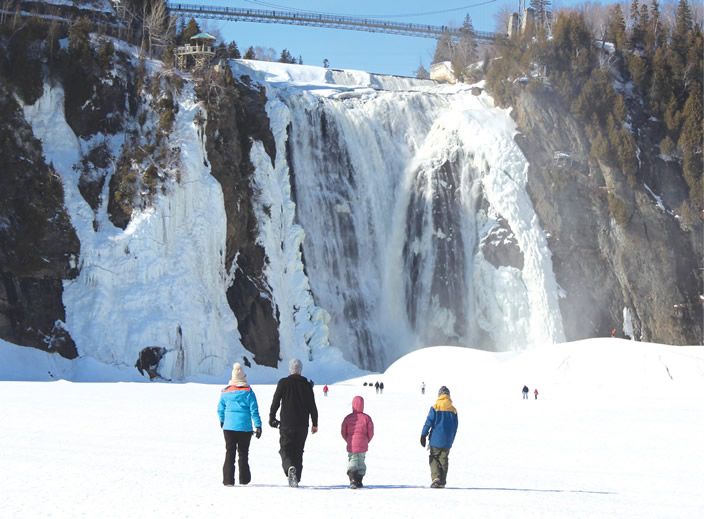
Off to Canada
When I was a child, my family moved to Tokyo for two years for my dad’s work. They were happy, adventurous years, and it was always my dream to provide such an experience for my own children. For 2020 my family decided to go on a teacher exchange to Canada – we wanted a challenge, an adventure, some togetherness. And so far we have had it all – but in a different way to what we had imagined!
We flew out of Sydney in December 31 with eight large suitcases, two ski bags and three children, ready for the adventure of a lifetime. I didn’t need to start my job teaching science in Barrie, Ontario, until the end of January, so we made the most of the time we had to ‘ski Colorado’ on the way.
We flew into Canada in time for a snowstorm. Our home for the year is like a dream – nestled in the snow, backing onto a golf course, a short walk to a ski mountain. Every day I look out the window and am astounded by the beauty of this place.
Starting school
At Bear Creek Secondary School in Barrie I was welcomed and quickly made to feel at home. My students come from a diverse range of socioeconomic backgrounds and have a huge range of abilities. The curriculum is structured so that from as early as Grade 9 (when high school starts), science is split into three levels: academic; applied; and locally developed. Students only do science for one semester, but teachers see them twice as often in that time as they would in NSW.
This semester I have two Grade 9 Academic classes (the curriculum is very similar to Year 9 in NSW), and a split class which is a mixture of Grade 9 applied and locally developed.
Students don’t have technology in school like they do back home. They don’t bring laptops to school, and many don’t have them at home. It was a challenge to switch back to paper-based resources, but also fantastic to see the stronger focus of many of the students when technology was removed.
My applied/locally developed class has a range of needs I was not experienced with, such as varying literacy levels. I essentially needed to teach two different versions of the curriculum to the class. But I have enjoyed the flexibility to focus on the areas of more interest to these students, rather than being required to push through the entire academic curriculum. In our chemistry topic, for example, we explored the science behind salting roads and how it affects road safety, and what is rust and the impact of salt and water on vehicles.
Online learning
One day before the one-week March break, the Ontario government announced that students would have an additional two weeks off school to reduce the spread of COVID-19. We headed off for a ski holiday in Quebec, only to find the mountain closed the day before our arrival. We quickly changed our plans to include a wildlife park (Parc Omega, where we saw wolves), snowmobiling and dogsledding. Then we headed back home to begin self-isolation.
When school resumed, it was by distance learning only. The first step was to make contact with all my students and determine what level of access they had to technology. The standard 6.5 hours of instruction to each of my classes per week was reduced to three via distance learning. This was to minimise time in front a computer, and to accommodate families who needed to share technology. Where students do not have access to technology, teachers prepare paper-based resources and the school distributes them to the students.
I don’t have video meet-ups with students (for child protection reasons), and students can pace themselves for the week. I have cut out some of the curriculum content, and am balancing giving students enough to sink their teeth into but not overwhelm them. We are no longer giving grades, but I review their work and give students feedback of “got it” or “not yet”.
My students are using a range of online resources that we couldn’t use in the classroom, giving them a choice of how they learn the content. They submit work via online quizzes, Google slides and making videos. I have been impressed with their standard of work.
Almost all of my academic students have embraced this different kind of classroom; but there has been a mixed response (and in some cases, no response) from my applied/locally developed students, although I have been pleasantly surprised by many of them.
Family life
We got to enjoy the snow and skiing before the mountains shut down due to the virus – our children skied after school until 8-9 pm every night. We’ve explored mountain bike trails, and now that the snow is melting we can still be active while maintaining distance from others. We have wonderful, supportive neighbours and we feel safe and cared for.
We are in a good place to isolate, and in some ways it is easier for us – we expected to be challenged this year, to be separated from our friends and family, to have more ‘togetherness’. COVID-19 has made it possible for us to be more connected with home – our friends and family are around and available to talk, we can ‘attend’ our church at home, and our kids get up at 4.30 am to go to youth group with their friends back home.
We are hoping that by the time summer rolls around, a little more of Canada will have opened up and we can see some more of what this beautiful country has to offer.
Either way, this year is one we will never forget, and we are so glad we did it.


































































































































